self reflections of a striver
the end of history and the search for meaning
In this essay I explore:
what is a striver
A striver is a member of the educated professional class who organizes life around upward mobility in wealth and social status. In the west, first and second generation immigrants are disproportionately represented in this cohort.
Strivers typically come from home environments that set high expectations for achievement, emphasize hard work, and normalize competition. Mimetic rivalry is the motivational engine of the striver. Most strivers are routed into prestige tracks like finance, tech, law, consulting, and medicine. It has gotten harder over the last generation to strive and prestige tracks have grown crowded, drawing more strivers further out the frontier of risk.
Strivers are overrepresented in the Crypto and AI industries, where much of the outsized opportunity of this decade has emerged. These industries offer the best chance of breaking into the modern landed gentry class: accumulating enough wealth to live entirely off of capital gains.
what are striver religions
Status anxiety is the dominant mood of the striver class. Its collective consequence is the rise of secular striver religions that promise a path to an end of history where the striving can finally stop.
For crypto strivers, the end of history occurs when the fiat system suffers a collapse of trust from unsustainable debt, causing the world to re-denominate in a neutral reserve currency.
For AI strivers, the end of history occurs when an AI model becomes capable of automating virtually all white collar work, causing a collapse in the value of labor.
In both visions, the end is a binary event that sorts civilization into winners and losers. Heaven is for the faithful who bought the right coin or vested equity in the right AI company, securing a place at the top of the social hierarchy. Hell is for the wagecucks, the NPCs, the permanent underclass, forced to eat bugs, consume slop, and live as slaves to the API.
what are striver memes
Cultural values of striver religions spreads through memes.
Anxiety memes fuel the hustle. The window of opportunity is closing. It will only get harder from here. The end of history could arrive at any moment. Lock in now and retire your entire bloodline or get left behind in the permanent underclass.
Utopian memes offer tiers of eternal bliss to chase. 30 million dollars liquid and fuck off forever. 5’10 swedish models on a superyacht. Transhumanist immortality. Colonizing the stars. Dyson spheres. All of it hidden inside your laptop, you just need to press the right keys to get it out.
Devotion memes serve as status contests. Drop out of Stanford, raise oversized rounds from venture capitalists, trade/code at parties, sleep on bare mattresses in empty apartments.
We’re well aware people will buy into crazy ideas as long as it’s supported by whatever community they associate with.
- Peter Thiel
God has died in western secular societies so they now direct their worship to the material world.
Let’s dive into the history and culture around our case study of modern strivers.
what are the origins of striver religions
Secular striver religions descend from western culture, which itself descend from Christian culture. These secular religions inherited Christianity’s eschatology.
Eschatology is the study of how things end. An eschaton is a final ending. People dislike uncertainty and tension, so they turn to religion for a resolution. The final resolutions of many secular religions borrow the Christian eschaton—the second coming of Christ, where everyone is resurrected and sorted into heaven or hell—and repurpose it for the material world, adapting it to modern political and technological knowledge.
Individually: heaven looks like wealth and power; hell looks like failure and falling short of your parents. Collectively: heaven is hyperbitcoinization or an AGI paradise; hell is state financial tyranny or a rogue AI.
elite overproduction
Peter Turchin calls the driver of today’s status pressure elite overproduction. When a society creates more elites and elite aspirants than there are elite positions, competition intensifies, instability rises, and status conflict spills into politics and culture.
The unusually prosperous boomer decades produced more elite aspirants than legacy prestige tracks could absorb and the imbalance has been further exacerbated by globalization and immigration.
The result is a civilizational oversupply of strivers and a bottleneck of prestige. Status is inherently positional, and not everyone can be at the top. Coupled with stagnant living standards, this social scarcity amplifies anxiety and mimetic rivalry across the striver class and creates the cultural phenomenon we see today.
No matter how much abundance we create, prestige games persist because being better than others is a tournament not everyone can win. Prestige has long powered civilization’s motivation engine. The striver class often shapes history because its members are educated, literary, and ambitious. Napoleon for example is the archetypal striver, a provincial outsider who rose to conquer the west.
Today much of the striver energy is being routed into positive sum games like Crypto and AI, but misdirected striver energy has historically turned violent.
historical striving
Eric Voegelin claims the secular religions we build around politics and technology are the result of filling the void of meaning left by the decline of traditional religion. In his view, the educated and ambitious strivers of the twentieth century formed secular religions around politics that drove some humanity’s worst atrocities.
In Nazi Germany, heaven was national rebirth and a Thousand-Year Reich, hell was Weimar disorder and the humiliation of World War I, and the path to salvation was total war, the purging of the Jews, and the myth of Aryan supremacy.
For Communist strivers, heaven was a classless utopia of planned abundance, hell was bourgeois domination and corruption, and the path to salvation was seizing property, abolishing markets, purging class enemies, and installing a state run economy.
Don’t immanetize the eschaton
- Eric Voegelin
Immanentize means to bring into present worldly form.
Voegelin’s warning emphasizes the lesson of the twentieth century: Do not try to create heaven on earth. The road to hell is paved with good intentions.
How has civilization calibrated from this?
postmodernity and the katechon
In the postmodern age, we have grown skeptical of the grand narratives of the twentieth century.
From that distrust came a penchant for restraint—the katechon— or the biblical restrainer that holds back the Antichrist (the false savior who sells a fake utopia). In modern life the katechon typically refers to institutions that slow down progress.
Restraint made sense after world wars and fears of nuclear apocalypse, but Peter Thiel argues the west pushed restraint too far and turned “never do big things” into its own grand story. Thiel views trends like climate alarmism and overregulation as some of the impeding katechons of our time that have contributed to the stagnation and the decline of western power.
His riff—“don’t immanentize the katechon”—means do not try to make permanent restraint our end state.
His takeaway for civilization moving forward is to recalibrate the pace of growth with the right tempo. Don’t chase utopias and immanentize the eschaton, but don’t overshoot and accidentally immanentize the katechon.
Let’s synthesize these ideas into the present day.
the future of secular religion
Religion has worked as a civilizational coordination system that patches over time to incorporate new knowledge about the world from technology, to absorb new knowledge about ourselves from culture, and to manage the collective anxieties the technological and cultural shifts create.
The west accelerated so quickly that they threw out much of the old religious system and built a new system out of the marriage of capitalism and liberal democracy. We watched rival systems rise and fall and rode extreme volatility as we calibrated our own. Many of today’s longstanding cultural disagreements arise from contradictions and frictions between the legacy system and the new system.
Techno-optimism and accelerationism are two of the most recent ideological patches to pierce the zeitgeist over the past decade that take material form in the Crypto and AI industries. A Marxist would be unsurprised that the immense wealth generated from these industries have begun to shape the superstructure of our system in the culture, the philosophy, the politics, and even the religion.
You can see the drift in the Overton window over the past year. Peter Thiel is the pope for tech and finance bros. Curtis Yarvin’s memes influence the White House. Nick Land’s ideology is discussed on Tucker Carlson. Equity indices 401(k)s now purchase Bitcoin.
The power of technocapital ideologies tracks market prices, and with markets ripping new all time highs every day you can feel the mix of ecstasy, anxiety, panic, awe about where our civilization may be headed. Counter-trend ideologies in techno-pessimism and decelerationism form the other side of the dialectic over how fast to grow. We are trying to thread the needle between immanentizing the eschaton and immanentizing the katechon, and it now animates much of the secular religious debate among the striver class.
Let me add some self reflecting from my personal life and then resynthesize.
self reflections of a striver
Sometimes I look back at I look back at my choices, and wonder if I had any free will or if I was simply carried by larger cultural currents. I look back at the retarded mental prisons I constructed and the ideologies I bought into and I can’t help but laugh. Life really isn’t that serious. I am blessed to be able to play this game whenever I feel like it. The outside world moves so slowly, it feels like it is lagging years behind what is happening at the frontier online. Part of the torture was thinking that I was missing out on something only to realize that the party is happening right here.
Like many born into the striver class, the engine of competition took me far in life. I hopped across prestige tracks, adopted the secular religion of crypto, sacrificed everything in my life, and hypergambled my way into elite status.
After I won the capital game that I thought would end all games, I realized I could not make myself do anything unless I turned it into a competition and built a mini eschatology around it. For me that mindset was inseparable from extreme intensity, and I was not willing to pay the same price in relationships and health again. Sleeping in silk pajamas makes it hard to believe the hell you are escaping is that bad or the heaven you are chasing is that good.
So I stepped away from the markets for six months and refused to do anything I didn’t feel compelled to do, just to see what I liked for its own sake. The only thing that reliably pulled me into flow was reading about the world and synthesizing it into writing I could share.
This diagram of the extended Maslow’s pyramid resonated with me. Beyond prestige sit higher order growth needs. Reading fed the desire for knowledge and understanding, writing fed the desire truth seeking and creation, and together they serve the search for beauty and form. In my experience, the basic needs seemed to respond more to pressure but the higher ones seemed to respond more to an inner search for meaning and call to action.
My self reflection clarified my understanding of the place of markets in the world. Technocapital has reshaped the superstructure of our civilization for centuries and will keep doing so. Markets are collective truth discovery machines encode information and allocate resources effectively. Interacting with markets will only continue to redefine what it means to be human in a connected civilization by changing the fabric of how we perceive, decide, and relate.
It also clarified my understanding of the place of markets in my own life. I see these truths because I lived inside the machine, and I only could have lived there because it first filled my desires for money and the need to win. I am not going to downplay how sweet the taste of victory is. It is a powerful fuel that people have dedicated their lives to and gone to war for. But that fuel is finite. It demands sacrifices that eventually hollow out meaning. Competition cannot be the highest calling. It is a tool, not a telos.
I came to the machine for the pursuit of glory but I cannot ignore the truth and beauty of markets I have observed. If the goal is understanding, winning just becomes a useful external reference, not the end.
Seen this way, the two motivational engines serve to reinforce each other. Winning gives me perspective to understand the world. Understanding the world helps me win the right games. Glory serves higher order meaning rather than replacing it. The finite game fuels the infinite one.
Trading markets is often dismissed as soulless and zero sum. For every winner there is a loser. I think this is a narrow view. The culture will keep softening its view on markets. Our discourse on technocapital has moved through something like the five stages of grief at a civilizational scale. We are somewhere in depression and are edging toward acceptance. Markets are one of the most positive sum projects of the modern world. Other games either hide their losers under the bed or do not scale. That transparency matches what I value. With power games you have to act like a saint in public while being Machiavellian in private. I would rather do the opposite — let the outside look like strategy while immanentizing not eschatons or katechons, but truth, beauty, and good.
hiring
I’m happy to announce that I am returning to trading full time. This time with a higher goal. If this resonated with you and you are interested in working together please DM me on twitter or telegram with a resume and a one line sentence on what you are elite at. Scimitar Capital is looking to hire three analysts and traders at a very competitive market rate.
inspirations
Huber, Tobias. “The Singularity Has Already Happened - First Things.” First Things, 24 Mar. 2025, firstthings.com/the-singularity-has-already-happened/.
Sun, Jasmine. “Are You High-Agency or an NPC?” Jasmi.news, @jasmi.news, 21 Sept. 2025, jasmi.news/p/dictionary.
Thiel, Peter. “Against Edenism - First Things.” First Things, June 2015, firstthings.com/against-edenism/.
Huber, Tobias, and Byrne Hobart. “Things Hidden”: Mimesis, Technology, and the Apocalypse. 2024, papers.ssrn.com/sol3/papers.cfm?abstract_id=4848080, https://doi.org/10.2139/ssrn.4848080.
Smith, Noah. “The Elite Overproduction Hypothesis.” Noahpinion.blog, Noahpinion, 4 July 2025, www.noahpinion.blog/p/the-elite-overproduction-hypothesis-994.
Rao, Venkatesh. “The Premium Mediocre Life of Maya Millennial.” Ribbonfarm, 17 Aug. 2017, www.ribbonfarm.com/2017/08/17/the-premium-mediocre-life-of-maya-millennial/.
Lakin, Chris. “Thoughts on and Conjectures about Finite and Infinite Games.” Chrislakin.blog, Locally Optimal, 14 June 2022, chrislakin.blog/p/thoughts-on-and-conjectures-about.
Lonsdale, Joe. “Dialectical Wisdom - Joe Lonsdale.” Joe Lonsdale, 21 Apr. 2017, joelonsdale.com/dialectical-wisdom/.
“Digital Constructivism - Stane Jagodič.” Stane-Jagodic.com, 2025, www.stane-jagodic.com/Digital-Constructivism.






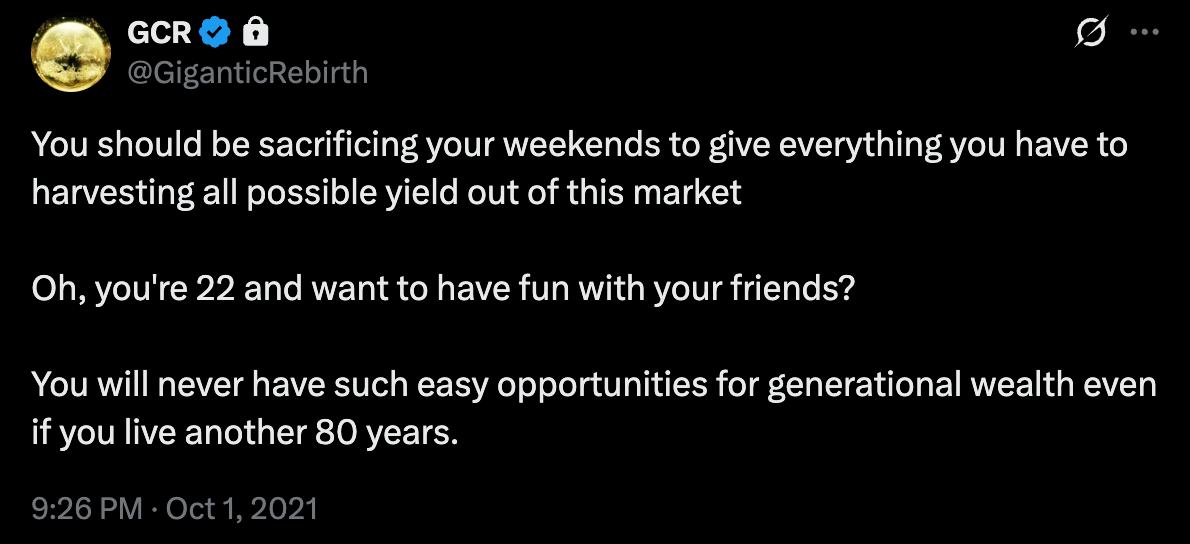

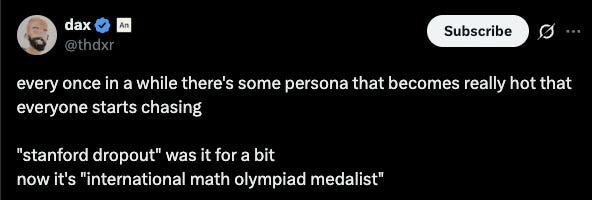
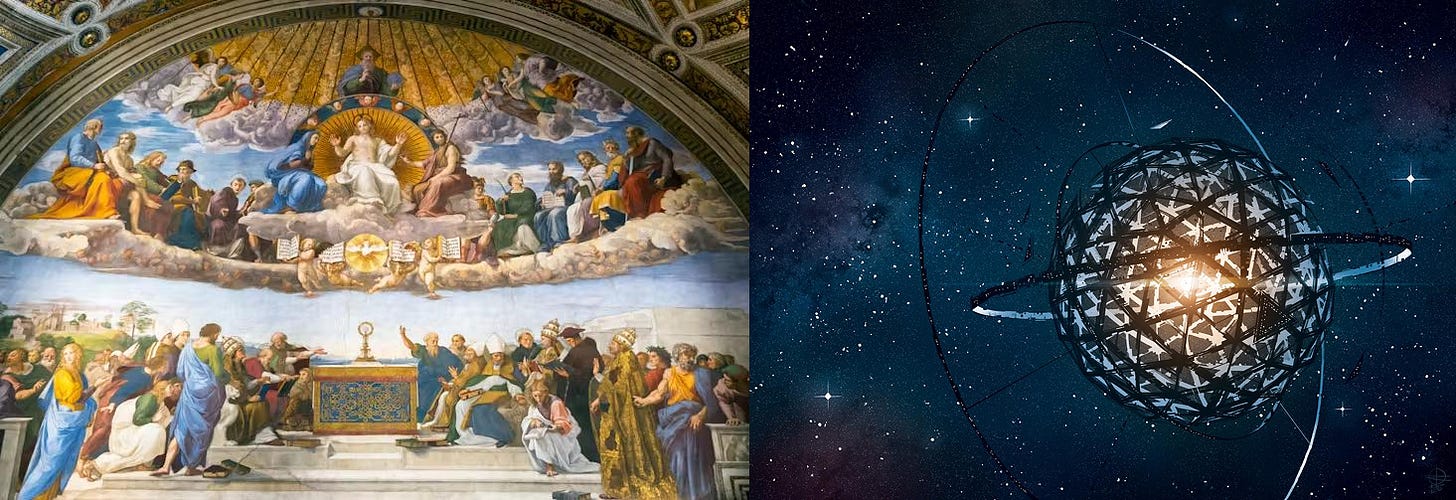
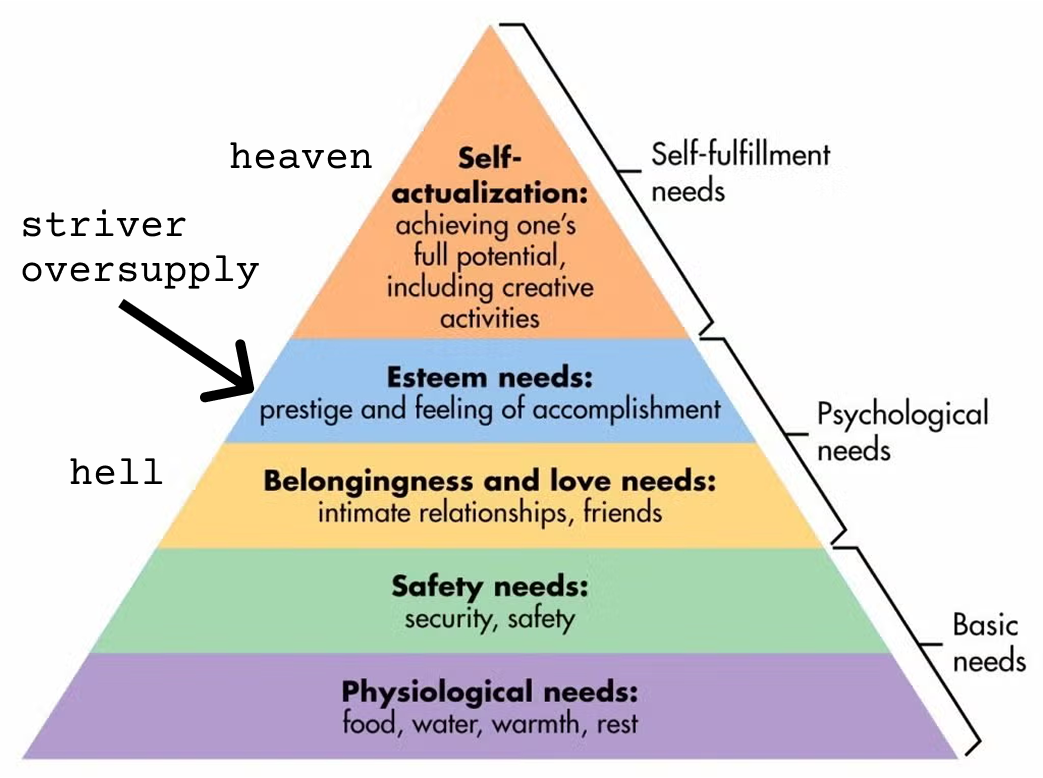
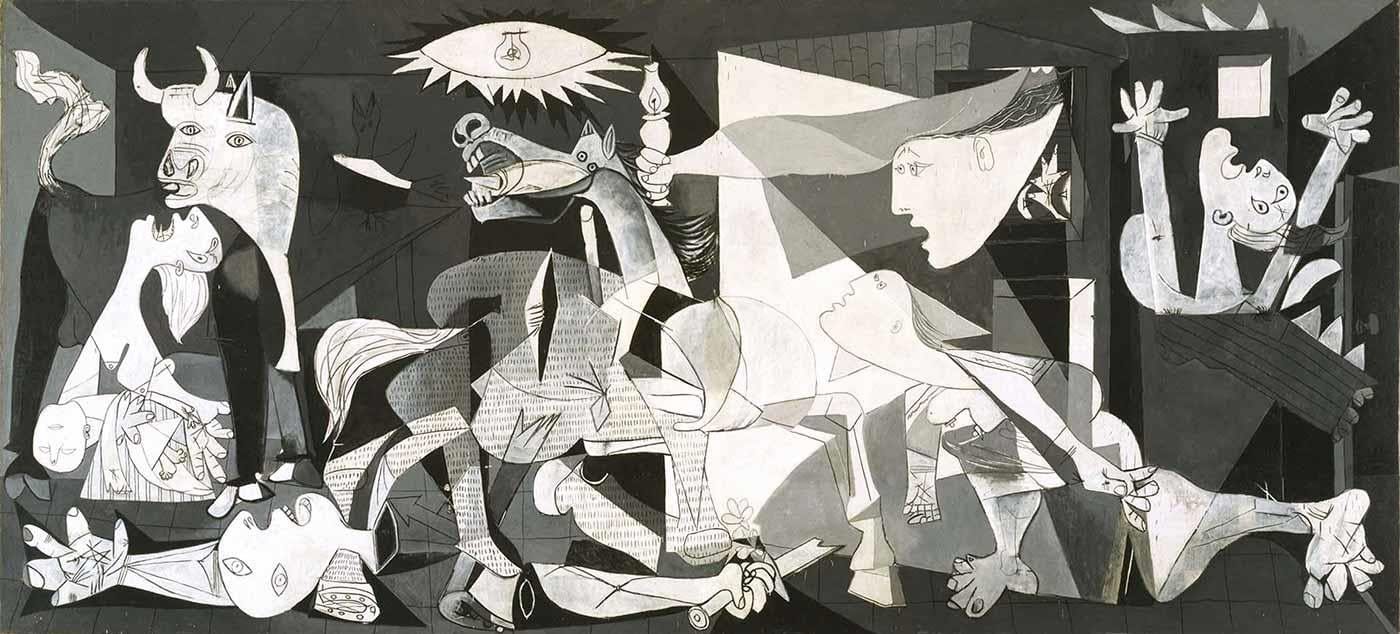







Such a great article and then you end with “getting back into trading full time…” SAD! I’m sure it’s thrilling, addicting, obviously very rewarding if you’re talented.
But don’t you want to make something, do something? Trading is zero sum, and zero sum games feel a bit “low” to me.
I would reconsider. You’re a great writer btw. I have your last article saved in my inbox.
Incredible article Thiccy, please keep them coming. Wish I wasn't late to reading this